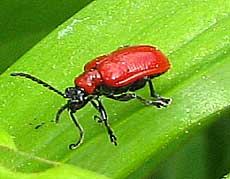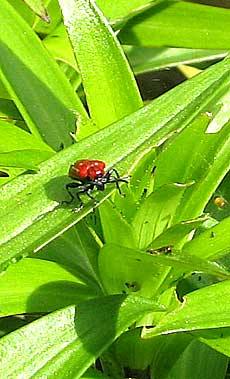How to control Scarlet Lily Beetle infestations
SCARLET LILY BEETLE - A DESTRUCTIIVE GARDEN PEST

The Scarlet Lily Beetle, Lilioceris lilii, is a garden pest which is very destructive to lilies and fritillaries.
The red lily beetle is about 8 - 10 mm long and is a native of Eurasia.
Lily beetles came into the UK on imported lilies at the start of the 1900's. Now they are commonly found in the South East of England, but are spreading all over the UK.
The bright red adult lily beetles feed on the flowers, leaves and stems of the lily.
The small black larvae of the lily beetle also leave holes in the flowers and leaves of lily plants. They cover themselves in excrement - disguising themselves as bird droppings!
An infestation of lily beetles in the garden or greenhouse can destroy and kill lily bulbs and plants.
LIFECYCLE OF THE RED LILY BEETLE
 The
adult lily beetles spend the winter in sheltered places
in the garden - not necessarily near lilies.
The
adult lily beetles spend the winter in sheltered places
in the garden - not necessarily near lilies.
The red beetles come out of hibernation in late March - May then from late April -September they feed on the lilies and lay eggs on the underneath of leaves of lily plants.
The eggs take about a week to hatch - producing beetle larvae which feed on lily foliage.
The lily beetle larvae are fully grown in about 2 weeks - they then pupate in the ground and in 2 -3 weeks emerge as adult lily beetles.
HOW TO CONTROL LILY BEETLE USING ORGANIC METHODS
An infestation of Lily Beetles can be controlled by using organic methods of pest control.
In springtime inspect young lily plants as they appear - remove any visible adult beetles and larvae - the bright red beetles should be easy to spot! This will help to prevent any infestation becoming established.
If you have pot grown lilies and fritillarias - repot them in early spring and destroy the old compost to kill overwintering lily beetles.
Although these beetles have no natural enemies in the UK encouraging wildlife into the garden may help.
Avoid using chemical preparations as these may affect beneficial insects in the garden such as bees.
CHEMICAL METHODS OF KILLING LILY BEETLES
if you decide to use chemicals to control a lily beetle infestation spray lily plants with thiacloprid, imidacloprid or sunflower oil as soon as you see signs of lily beetle damage .
Chemical methods of control are generally more effective on the larvae than adult beetles.
USEFUL ARTICLES ON GARDEN GROWER
| Winter Pests | Topsoil London |